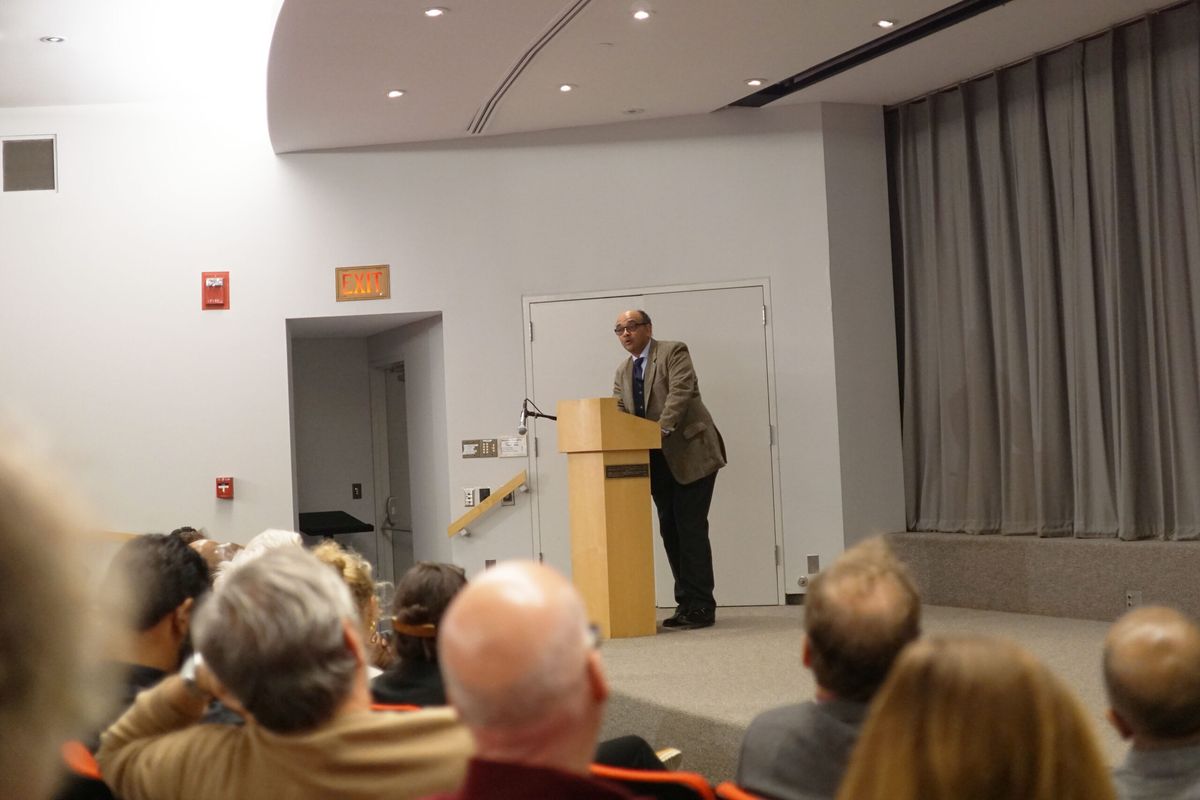Philosophy Professor Examines Identity in Talk

Award-winning professor and author Kwame Anthony Appiah gave a talk titled “How to Not Think About Race, Culture and Class” on Thursday, Nov. 2, in Stirn Auditorium, during which he discussed the origins of perceptions of race, culture and class and offered an alternative lens.
Appiah is a professor of law and philosophy at New York University and has previously taught at institutions such as Cornell, Harvard, Yale and Princeton. He has published several books, including “In My Father’s House: Africa in the Philosophy of Culture,” “Cosmopolitanism: Ethics in a World of Strangers” and “The Ethics of Identity.”
In 2012, President Barack Obama awarded Appiah the National Humanities Medal for “seeking eternal truths in the contemporary world,” according to the official citation for the award.
Appiah began his talk by examining the racial constructs of the mid-19th century when the debate on slavery intensified.
He presented an initial perspective on race: “That all of us carry within us something that belongs to the race to which we belong.”
According to Appiah, this ideology became the moral justification for slavery.
Appiah defined this interpretation of race as racial fixation and compared it to the typological assumption that “everyone was a representative of a racial type.”
However, he notes that biological similarities do not fixate things like taste in music or poetry. Building on this premise, Appiah transitioned into discussing the concept of culture, which he said is comprised of ideas that bring groups together.
“Nowadays, when people speak about culture, it’s usually Tyler’s or Arnold’s,” said Appiah, referring to two popular anthropologists’ theories. Arnold van Gennep believed that primitive culture does not exist, while Edward Burnett Tyler argued that it is impossible for one to lack culture.
Despite these contradictory philosophies, Appiah said that the two create Western culture. At the brink of the Cold War, Appiah said that Western culture was founded on ideas like “democracy, the Magna Carta [and] Plato.”
Appiah, however, questioned whether Western nations actually upheld these principles. Western culture, he said, is built on ideas that aren’t accessible to most people, but it exists because people place repeated emphasis on this culture.
“If Western culture were real, we probably wouldn’t spend so much time talking about it,” he said. “The traditions of the West … are only ours because we care about them.”
Appiah then introduced the concept of meritocracy, or a belief that the economy should reward merit. He challenged meritocracy with a caveat. “Access to that top fifth is increasingly the result of being born into it,” Appiah said. Often times, merit is measured by how much one can contribute to the economy, Appiah said.
However, he acknowledged that the challenges for each individual to obtain that merit are unique. As a result, he said, “There is no comparative measure … no single scale of human worth.”
“Money and status are social rewards that incentivize people to doing the things they are doing,” Appiah added. “It will be a matter of luck whether you inherit the capacity whose development will be rewarded by the society to which you were born.”
In the Q&A session following his talk, Appiah answered questions on topics ranging from reparations to white supremacy.
Nishant Carr ’21, who attended the event, found Appiah’s analysis on claiming identity, especially in relation to white supremacy, most interesting.
“It makes sense when he said that [he] will call someone a Nazi because they do assume that identity, or I will call someone a literary critic or a scholar because they put in the work for it,” he said. “I like what he said about people assuming identities of their culture.”





Comments ()